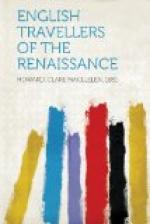How little the solemnity of the Spanish nobles pleased English courtiers used to the boisterous ways of James I. and his “Steenie,” may be gathered from The Perambulation of Spain.[283] “You must know,” says the first character in that dialogue, “that there is a great deal of gravity and state in the Catholic Court, but little noise, and few people; so that it may be call’d a Monastery, rather than a Royal Court.” The economy in such a place was a great source of grievance. “By this means the King of Spain spends not much,” says the second character. “So little,” is the reply, “that I dare wager the French King spends more in Pages and Laquays, than he of Spain among all his Court Attendants.” Buckingham’s train jeered at the abstemious fare they received.[284] It was in such irritating contrast to the lofty airs of those who provided it. “We are still extream poor,” writes the English Ambassador about the Court of Madrid, “yet as proud as Divells, yea even as rich Divells."[285] Not only at Court, but everywhere, Spaniards were indifferent to strangers, and not at all interested in pleasing them. Lord Clarendon remarks that in Madrid travellers “will find less delight to reside than in any other Place to which we have before commended them: for that Nation having less Reverence for meer Travellers, who go Abroad, without Business, are not at all solicitous to provide for their Accomodation: and when they complain of the want of many Conveniences, as they have reason to do, they wonder men will come from Home, who will be troubled for those Incommodities."[286]
It is no wonder, therefore, that Spain was considered a rather tedious country for strangers, and that Howell “met more Passengers ’twixt Paris and Orleans, than I found well neer in all the Journey through Spain."[287] Curiosity and a desire to learn the language might carry a man to Madrid for a time, but Englishmen could find little to commend there. Holland, on the other hand, provoked their admiration more and more. Travellers were never done exclaiming at its municipal governments, its reformatories and workhouses, its industry, frugality, and social economy. The neat buildings, elegant streets, and quiet inns, were the subject of many encomiums.[288]




